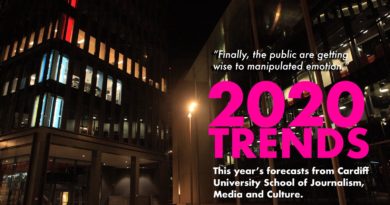Lessons from The International Journalism Festival, 2016
By Una Kelly, MA Journalism student 2015-16
“It seems like these days to be a journalist you also need to be a computer science expert and hacker and lawyer,” someone whispered next to me. We were at the International Journalism Festival (#ijf16) in Perugia, Italy, which brings together people working at the cutting edge of journalism for five days of discussions and workshops. In an industry changing so fast there was lot to learn, but the atmosphere was one of optimism and excitement about the state of journalism.
The common thread from most conversations was ‘innovate or die’. The need for good reporting and storytelling hasn’t changed, but the architecture of how we tell stories has. With 60% of the BBC’s traffic now coming from mobile, Trushar Barot, mobile editor of the BBC World Service, said a news organisation will not survive if its content doesn’t work on a mobile device – and Jomec’s Richard Sambrook made the point that mobile journalism is not an just an adjunct to TV news.
Several speakers, including Megan Lucero from the Times data journalism unit, even commented we need to stop talking about ‘digital journalism’ and ‘data journalism’ and just call it journalism, since they are no longer facets of journalism, but just what the trade now is. It was mentioned many times that entry level journalists should at least be able to do some basic data manipulation and coding. On a panel called ‘Why do journalism schools still teach like it’s 1996?’, Jomec’s MSc Computational and Data Journalism got an honorary mention when John Crowley, editor-in-chief of the International Business Times, said the course teaches exactly the skills he’s looking for in a journalism graduate.
What was most striking was how the conversations showed the increasing role of engagement and collaboration. The days of the top-down relationship (publishing -> reading) are over and community editors from The Guardian, The Washington Post and The New York Times all said news organisations need to start engaging with the people who consume their comment in order to survive. According to Mathew Ingram from Fortune, “Journalists not engaging with their community is like throwing a party and not showing up.”
Engagement can take many forms other than the dreaded comment thread – for example, polls, or a call-out for reader experiences like the Guardian does. Greg Barber is developing the Coral Project (highly recommend checking this out), a collaboration between the Mozilla Foundation, The New York Times, and The Washington Post, which creates open-source tools and resources for publishers to build better communities around their journalism. He says their research shows the participation of a journalist can transform the quality of an online discussion since it demonstrates interest and commitment. Creating community is also a smart business move, since it creates reader trust and loyalty, in turn leading to more subscribers – look at the example of Guardian readers becoming ‘Guardian supporters’ and donating money each month to fund journalism. Daniel Drepper, from Correct!v, a newsroom which routinely crowdsources investigations (tip: start by just asking people what they want to be investigated), made the point that journalists need to have the humility to accept their readers may know more about a subject than they do themselves, and this improves the quality of their work. In response to a point that smaller newsrooms may not have the resources to deploy greater community engagement, Greg Barber said it’s even more important for smaller newsrooms since the relationship with their readers is the most important thing they have.
The end of the top-down relationship and the rise of interactive journalism throws up a lot of new issues and many workshops were dedicated to fair use and verification issues. For example, if a journalist requests on Twitter to use someone’s photo or video, what does that actually get them? Do they have rights to use it in perpetuity? On what platforms can they use it? Journalists should take screenshots of these interactions, but permission on Twitter alone cannot always be relied on, since it can be retracted at any time, which may mean the journalist has to keep monitoring the interaction for a long time. It’s not always practical, but Fergus Bell from First Draft News recommends attempting to get full written permission. CNN and Buzzfeed are just some of the organisations who have faced litigation over UGC and have found, to their cost, that it’s more effective to be ethical.
It can be a minefield out there when social newsgathering, and every time a journalist falls for a fake it undermines their credibility. First Draft are an excellent resource for verification guides (for example, to verify a YouTube video, reverse image search the thumbnail using YouTube dataminer). UGC also brings more responsibilities – for example, a woman who took one of the key photos in the Charlie Hebdo incident owns a hat shop in Paris. When someone Googles her name, there are now ten pages of search results about the incident before it gets to her hat business. Is this fair? Would she have given permission for the photo to be used if she was aware of the potential negative impact on her business? Online News Association presented a Social Newsgathering Ethics Code, which sets out best practice and also obliges newsrooms to protect the mental health of journalists working with traumatic UGC.
There was a discussion about the relationship between platforms and publishers but a noticeable absence from the festival was a representative from Facebook. Mathew Ingram tweeted that the company needs to be part of the conversation for as he said, “You create the stuff and you throw it into the wind – and Facebook increasingly controls the wind.”
The rate of innovation is enormous. Emily Bell from the Tow Center at Columbia University said when she was last at the festival three years ago, no one could have imagined there would now be a panel called ‘Can a robot do my job?’ The answer: maybe, but robotics could allow journalists to focus on the why instead of the what, and there’s no substitute for human editorial judgment. The biggest lesson is to keep experimenting and not be afraid of ‘failing fast and small’. We can’t stop technology so we have to work with it.
For the past two years, five students from the UK, France, Italy, Germany and Spain have had the chance to enter an essay contest and win a scholarship to the festival which includes flights, accommodation and delicious Italian food. Check the festival website around February next year for details. The essay topic for 2016 was ‘Journalism in the digital era’ and will be published in The Times.


